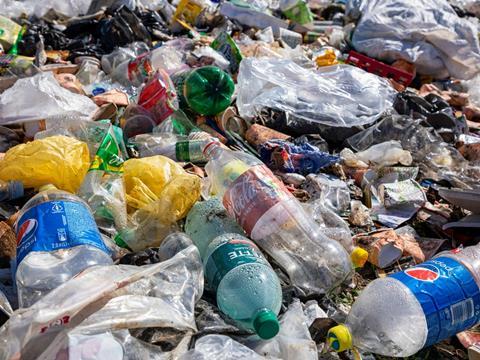
The United Nations Environment Programme (UNEP) has released a report laying out the concrete practices, market shifts, and legislation that it says international policymakers could implement to pursue an 80% reduction in global plastic pollution by 2040 and a transition into a circular economy.
Titled ‘Turning off the Tap: How the world can end plastic pollution and create a circular economy’, the report precedes a second round of negotiations for a global agreement to beat plastic pollution and focuses on viable solutions that are expected to inform government thinking and business action. It identifies the elimination of unnecessary and ‘problematic’ plastics as an important step to reducing global plastic pollution by 80% by 2040.
Therefore, it lays out three market shifts to achieve this goal. The first is governmental support in promoting reuse options such as refillable bottles, bulk dispensers, deposit return schemes, and packaging take-back schemes – a shift said to achieve a 30% reduction in plastic pollution by 2040.
A further 20% reduction is expected if recycling is promoted as a stable and profitable business venture. Measures such as removing subsidies for fossil fuels and enforcing design-for-recycling guidelines are thought to increase the share of economically recyclable plastics from 21% to 50%.
Where appropriate, replacing plastic wrappers, sachets, and takeaway packaging, for example, with alternatives like paper or compostable materials is also anticipated to decrease pollution by 17%.
Even so, UNEP warns that, alongside an existing backlog of plastic pollution, 100 million metric tons of plastics from single-use products with short lifespans will need to be treated at end-of-life by 2040. The implementation of design and safety standards for the disposal of non-recyclable plastic waste, as well as increased manufacturer responsibility for any microplastics shed from their products, are two suggested methods of addressing the issue.
The report goes on to claim that a net increase of 700,000 jobs could be created by 2040 in the shift to a circular economy. Most of these jobs would arise in low-income countries, it is claimed, meaning the shift could serve as a valuable improvement to the livelihoods of workers in informal settings.
A five-year delay in investment costs for the recommended systemic changes is feared to create 80 million metric tons of plastic pollution by 2040. Although such costs are expected to be high, they are apparently lower than the current estimate of spending without the systemic change, at US$65 billion rather than US$113 billion. UNEP suggests that shifting planned investments for new production facilities that become unnecessary through a reduction in material needs, or placing a levy on further plastic production, would mobilise much of this spending.
In both scenarios, operational costs are expected to be the highest. However, Extended Producer Responsibility (EPR) schemes can apparently cover these costs with regulations in place to ensure that plastics are designed to be circular; the report asserts that producers can be required to finance the collection, recycling, and responsible end-of-life disposal of their plastic products.
Agreed criteria for banned plastic products, a cross-border knowledge baseline, and rules mandating the necessary minimum operating standards of EPR schemes are among the suggested internationally agreed policies expected to help in the wider transition into a circular economy – as well as creating new jobs, unlocking business opportunities, and bypassing the restrictions of national planning and business action.
A global fiscal framework could also form part of these international policies, UNEP suggests, which could apparently create a level playing field between recycled and virgin materials. This is also expected to benefit the creation of an economy of scale for solutions and the establishment of monitoring systems and financial mechanisms.
The report promotes an approach that implements and combines regulatory instruments and policies that cover the entire life cycle of plastic products – for instance, design rules that facilitate economic recycling can work in tandem with recycled content targets and fiscal incentives for recycling plants. It also addresses standards for design, safety, and compostable and biodegradable plastics; EPR schemes; taxes, bans, communication strategies, public procurement, and labelling, amongst other policies.
“The way we produce, use and dispose of plastics is polluting ecosystems, creating risks for human health and destabilising the climate,” said Inger Andersen, executive director at UNEP. “This UNEP report lays out a roadmap to dramatically reduce these risks through adopting a circular approach that keeps plastics out of ecosystems, out of our bodies and in the economy. If we follow this roadmap, including in negotiations on the plastic pollution deal, we can deliver major economic, social and environmental wins.”
An estimated US$1.27 trillion will be saved in the shift to a circular economy, according to UNEP, with recycling revenues and costs considered. Avoiding damage to health, climate, air pollution, marine system degradation, and litigation-related costs is expected to save an additional US$3.25 trillion.
This coincides with the Minderoo Foundation’s prediction that over $20 billion in liability claims could be made against the petrochemical industry between 2022 and 2030 in the US alone, largely due to the reported impacts of plastic pollution on human health.
Another UNEP report warned that the health hazards and environmental damage caused by over 13,000 chemicals used in plastic products and packaging call for an industrial re-examination.
Similarly, a joint statement from 185 investors with combined assets of US$10 trillion encouraged FMCGs, retailers, and other users of plastic packaging to combat plastic pollution by reducing consumption, phasing out hazardous chemicals, and supporting relevant policies.
If you liked this article, you might also enjoy:
McKinsey on whether or not on-pack sustainability claims affect consumer spending
A deep dive into the most important packaging sustainability trends and solutions














No comments yet